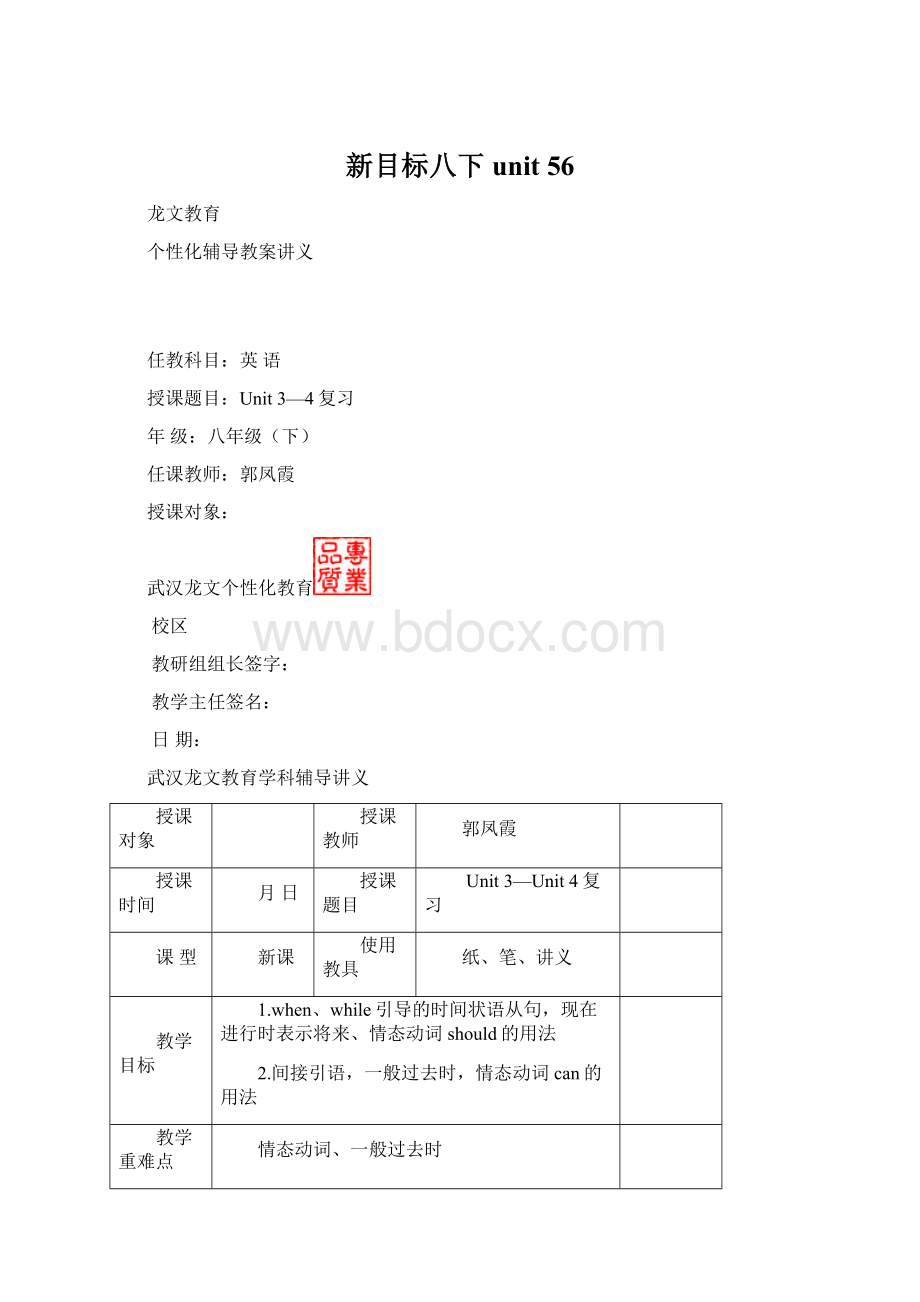新目标八下unit 56Word文件下载.docx
《新目标八下unit 56Word文件下载.docx》由会员分享,可在线阅读,更多相关《新目标八下unit 56Word文件下载.docx(20页珍藏版)》请在冰豆网上搜索。

1.when、while引导的时间状语从句,现在进行时表示将来、情态动词should的用法
2.间接引语,一般过去时,情态动词can的用法
教学重难点
情态动词、一般过去时
参考教材
龙文内部资料
教学流程及授课详案
Unit3
⑴过去进行时态
1)用法①表示在过去的某一时间点上动作正在进行。
IwasstudyingformyEnglishtestat5pmlastSunday.
②表示在过去的某一时间段内动作正在进行。
MybrotherwaslisteningtomusicwhileIwasdoingmyhomework.
2)句子结构①肯定句:
主语+was/were+现在分词
Theywereplayingbasketballwhenitbegantorain.
②否定句:
主语+wasn’t/weren’t+现在分词
Theyweren’tshoppingatthestorelastSaturdayafternoon.
③一般疑问句:
Was/Were+主语+现在分词?
-Washesleepinglatewhenyousawhim?
–Yes,hewas./No,hewasn’t.
④特殊疑问句:
特殊疑问词+was/were+主语+现在分词?
Wherewasthealiengoingwhenyousawhim?
⑵arrive到达,同义词有:
getto,reach
1)vi.独立使用。
Whattimeisthetrainarriving?
2)vi.~at+小地方;
~in+大地方。
3)vi.~here/there/homeFatherarrivedhomeverylateyersterday.
2Iwasstandinginfrontofthelibrary.
infrontof在……(外部)的前面inthefrontof在……(内部)的前面
①Ioftenseetheboyplayaloneinfrontofhishouse.
②Helikestositinthefrontoftheclassroom.
3cuthair(理发师)理发haveone’shaircut请人理发
4getoutgetoutof
⑴getout
①下车同义短语是getoff,但getoff一般是从bus,train,ship,plane或horse下来;
getout则一般是从car或boat下来。
getout反义短语是getin,而getoff反义短语是geton。
Themangotoutassoonasthecarstopped.
②出来,出去Theydidn’tgetoutuntilitstoppedraining.Itwasdifficultformetogetoutofbed.
③取出Hegotoutsomemoneyandgaveittome.Myballdroppedintothehole.Canyougetitout?
⑵getoutof
①从(car,boat等)下来Isawsomepoliceofficersgetoutofthecar.
②从……出来,出去③get…outof从……取出来
5when和while的区别
⑴从句所表示的时间含义不同。
1)when是atorduringthetimethat,既指时间点,也可指一段时间。
①Wewereplayingbasketballwhenitbegantorain.(从句表示一个时间点)
②Iusuallytakeabustoschoolwhenitrains.(从句表示一个时间段)
因此when引导的时间状语从句中的动词可以是终止性动词,如①中的began;
也可以是延续性动词,如②中的rains。
2)while是duringthetimethat,只指一段时间,因此while从句中的动词必须是延续性动词。
①WhileIwaswaitingforthebus,Isawanoldfriendofmine.
②CouldyoulookaftermypetdogwhileIamaway?
(注意:
“离开”之意不能leave来表达,因为它是终止性动词)
2常见的终止性动词:
appear,arrive,become,begin,borrow,bring,buy(买下),catch,close,come,die,discover,end,enter,fail,fetch,find,findout,finish,forget,getup,getto,give,go,hear,join,land,leave,lend,open,pass,puton,reach,receive,remember,return,see,sell(卖掉),start,stop,take(拿),takepartin,takeoff
⑵从句的动作和主句的动作发生顺序不同
1)when引导的从句的动作和主句的动作可以是同时,也可以是先后发生。
①Whatareyouusuallydoingwhenit’sraining?
(同时进行)
②WhenIheardthenews,theyhadleft.(left先发生,heard后发生)
2)while则强调主句的动作在从句动作的发生的过程中或主从句两个动作同时发生。
①Thecatwentupthetreeagainwhilethenewspaperreporterwastakingaphoto.
(主句动作wentup发生在从句动作takingaphoto发生过程中)
②WhileIwasdoinghomework,motherwascleaningtheroom.(动作同时发生)
⑶适用时态不同
由when引导的时间状语从句,主句用过去进行时,从句应用一般过去时。
如果从句和主句的动作同时发生,两句都用过去进行时的时候,多用while引导,如:
①Whentheteachercamein,weweretalking.改变主从句的位置=Whileweweretalking,theteachercamein.
②Theyweresingingwhileweweredancing.此句不能写成:
Theyweresingingwhenweweredancing.
⑷when和while还可作并列连词。
when表示“在那时”,andthen或andatthattime;
while表示“而,却”,表对照关系。
如:
①Thechildrenwererunningtomovethebagofricewhentheyheardthesoundofamotorbike.
②Heisstrongwhilehisbrotherisweak.
6AUFOlandedonCenterStreet.
landvi.降落,着陆;
登陆,上岸
TheplanewilllandatBeijingInternationalAirportin5minutes.
7WhatwasthegirldoingwhentheUFOtookoff?
takeoff
⑴脱掉(衣服)反义短语为puton后接代词作宾语时,须放在off前。
②Thedresswastootight(紧).Shecouldn’ttakeitoff.
⑵(飞机)起飞MyflighttoNewYorktookofffromBeijingInternationalAirport.
7IhadaveryunusualexperienceonSunday.
experience可数名词,经历nIhadsomepleasantexperiencesinthecountryside.
8IwaswalkingdownthestreetwhenaUFOlandedrightinfrontofme.
⑴此处right与just同义,“恰好,正”。
⑵此句同义句为:
WhileIwaswalkingdownthestreet,aUFOlandedrightinfrontofme.
9Youcanimaginehowstrangeitwas!
⑴strangeadj.它派生出的名词是stranger陌生人;
外地人,外国人
①陌生的Hefeelsverylonelywhenheisinastrangecity.
②奇怪的Thequestionsoundsverystrange.
⑵感叹句How+adj./adv.+主语+动词
①Howcleverthelittleboyis!
②Howharditisrainingnow!
10Ifollowedittoseewhereitwasgoing.
followvt.跟随,追随followsbtodosth跟随某人做某事
Hispetdogoftenfollowshimwhenhetakesawalk.
11Isn’tthatamazing!
⑴同义句为:
How
surprisingthatis!
⑵
amazing=surprising.
12You'
rkidding.kid=playajoke;
makefunof
Unit4
1.直接引语是指原封不动的引用原话,把它放在引号内,例如:
Mothertoldme,“Youshouldfinishyourhomeworkfirst,thenyoucangooutandplaywithyourfriends.”
Theysaid,“Wewanttohavearest.”
间接引语即用自己的话加以转述,被转述的话不放在引号内。
上面两个例句变成间接引语应该是:
MothertoldmethatIshouldfinishmyhomeworkfirstandthenIcouldgooutandplaywithmyfriends.
Theysaidtheywantedtohavearest.
2.当我们把直接引语变成间接引语时,由于引述动词(said,told等)一般都是过去时形式,因此间接引语中的动词时态、人称代词、限定词、时间状语、地点状语等一般都要做相应的变化。
有下面几种情况:
1)现在时间推移到过去时间
所谓现在时间推移到过去时间指一般现在时变为一般过去时,现在进行时变成过去进行时,现在完成时变成过去完成时。
例如:
Shesaid,“Iamhungry.”→Shesaid(that)shewashungry.
Hesaid,“Thefamilyarefightingamongthemselves.”
→Hesaid(that)thefamilywerefightingamongthemselves.
Tomsaid,“Ihavefoundwhat’swrongwiththecomputer.”
→Tomsaidhehadfoundwhatwaswrongwiththecomputer.
在下列场合,尽管陈述动词为过去时形式,间接引语中的动词时态却不必改变,即:
a)当引述的是客观事实、科学真理、现在习惯工作以及格言等内容时:
Hesaid,“Theword‘laser’isanacronym(首字母缩略词)”→Hesaidtheword‘laser’isanacronym.
b)当动词所表示的状态或动作在引述时仍在继续时:
“I’mforty,”hesaid.→Hesaidheisforty.
c)当谓语动词包含无过去时形式的情态助动词时:
Hesaid,“Itmustbeprettylate.Ireallymustgo.”→Hesaiditmustbeprettylate,andhereallymustgo.
Hesaid,“Youmustn’tsmokeintheroom.”→HesaidImustn’tsmokeintheroom.
2)过去时间推移到过去的过去
这里需要注意以下几点:
a)当强调动作或状态先于引述动词时,一般过去时要变成过去完成体。
Hesaid,“Ididn’tknowyou.”→Hesaidhehadn’tknownme.
当“过去的过去”已经不言自明,或者通过其他词汇手段予以体现,或者侧重于强调所转述的事实本身时,一般过去时形式可以不变。
Annsaid,“Shewasbornin1981.”→Annsaidshewasbornin1981.
b)过去进行时可以变成过去完成进行时,也可以不变。
Robertsaid,“IwasjokingwithMary.”
→RobertsaidhehadbeenjokingwithMary./RobertsaidhewasjokingwithMary.
c)过去完成时仍为过去完成时,不需改变。
Hesaid,“Wehadn’treturnedtothestorewhenshecame.”
→Hesaidtheyhadn’treturnedtothestorewhenshecame.
d)时间状语分句中的一般过去式或者过去进行时可以不变。
Johnsaid,“WhenIlivedinLondonIoftensawJane.”→
JohnsaidwhenhelivedinLondonhehadoftenseenJane.
JohnsaidwhenhelivedinLondonheoftensawJane.
3)将来时间推移到过去将来时间
最常见的是把表示将来时间的助动词由现在时形式变为过去时形式。
Hesaid,“We’respendingnextweekendathome.”→Hesaidtheywerespendingthenextweekendathome.
Shesaid,“Themilkwillgooff(变质)ifyoudon’tdrinkittoday.”
→ShesaidthemilkwouldgooffifIdidn’tdrinkitthatday.
Theysaid,“We’regoingtoHawaiithissummervacation.”
→TheysaidtheyweregoingtoHawaiithatsummervacation.
但是,在引述时,如果原话中的动作或者状态属于尚未到来的将来时间,那么,可以不推移到过去将来时间。
Hesaid,“I’llbewaitingforyoutomorrow.”→Hesaidhewillbewaitingformetomorrow.
4)人称代词、限定词、时间状语、地点状语的变化
由上面的例子可以看出,当直接引语变成间接引语时,除动词时态变化外,人称代词、限定词、时间状语、地点状语等通常也作相应的变化。
a)人称代词,除引述本人原话外,通常第一、二人称变为第三人称,或者第二人称变为第一人称;
限定词也作相应的变化。
Hesaid,“Weloveourcountry.”→Hesaidtheylovetheircounty.
b)指示代词this,these分别变成that/it,those/they或them;
指示限定词this,those通常变为that,those或the。
“Thishouseisveryexpensive,”shesaid.→Shesaidthathousewasveryexpensive.
Thechildrencamebackwithtwowalletsandsaid,“Wepickedtheseuponthepavement.”
→Thechildrencamebackwithtwowalletsandsaidtheyhadpickedthemuponthepavement.
c)时间状语在间接引语中的变化有三种情况:
i)时间状语和动词时态两者都变。
Hesaid,“Itwascompletesayearago.”→Hesaidithadbeencompletedayearbefore.
ii)时间状语不变,动词时态可变可不变。
Shesaid,“WeleftParisat8a.m.”→ShesaidtheyhadleftParisat8a.m./ShesaidtheyleftParisat8a.m.
5)代词等一般地应做相应的变化,变化方法见下表。
指示代词this→these
these→those
表示时间的词now→then
today→thatday
thisweek(month,etc)→thatweek(month,etc)
yesterday→thedaybeforelastweek(month,etc)→theweek(month,etc)before
threedays(ayear,etc)ago→threedays(ayear.etc)before
tomorrow→thenext(following)day
nextweek(month,etc)→thenext(following)week(month,etc)
表地点的词here→there
动词bring→take
come→go
教学内容:
HesaidIwashard-working.
Ⅰ.WordsandExpressions:
单词/短语
词义
讲解与例句
report
v.
报道;
报告
Shereportsdirectlytotheboardofdirectors.
surprise
n.
惊奇
Tomysurprise,everyonepassedthefinalexam.
mad
adj.
十分恼火的
bemadat
Shewasmadwithmeforlosingmykeys.
however
adv.
无论如何
Thisbookisexpensive,however,it’sworthit.
message
消息;
信息
There’samessageforyoufromyourcousin.
response
回答;
答复
Theymakeaquickresponsetomyinquiry.
suppose
假定;
认为
Isupposeyouareright.我想你说得对。
WearenotsupposedtoplayfootballonSundays.
hard-working
努力工作的
Everyoneknowsthatheishard-working.
average
平常的;
普通的
Heisamanofaverageability.
end-of-yearexam
年终考试
Hedidwellintheend-of-yearexam.
reportcard
成绩报告单
Haveyougotyourreportcard?
nervous
紧张的
IfeltverynervouswhenIwentintohisoffice.
envelope
信封
Canyoulendmeanenvelope?
luckily
adv
幸运地
Luckily,thepolicecamerightnow.
semester
学期
Asaseniorthreestudent,heisverybusythissemester.
lucky
幸运的
Sevenismyluckynumber.
start
使开始;
引起
Itstartedraining.
getover
恢复;
克服
Ittookmealongtimetogetovermycold.
Canwe